|
I can't help thinking that if Cine Outsider were a private club, one of those ones where the clientele is vetted before being allowed in, then appreciation of films like Shindô Kaneto's The Naked Island [Hadaka no shima] would probably serve as a membership card. I'm fully aware of the arrogance of that statement and that makes no concessions for personal taste, but we're talking metaphorically here, not laying out plans for the future of the site.
The Naked Island is just the sort of film that those who diet on 3D blockbusters and categorise a movie by how "awesome" it is would likely despise. If you doubt this supposition, find yourself a hardened action movie junkie and tell him or her these three facts about this film and watch their reaction: that it's a subtitled Japanese film with Japanese dialogue, of which there is precious little; that it was made in 1960 in black and white; and that the first thirty minutes consist almost solely of a farming couple silently transporting water across the bay from the mainland to the sun-baked island on which they and their children live, a sequence that plays out almost in real time. Did they immediately ask to borrow the disc from you or shake their head in horrified disbelief? Conversely, I was perhaps not all that surprised when on hearing that the film was coming to UK Blu-ray, fellow reviewer Jerry Whyte could barely contain his excitement. "I love that film!" he enthusiastically proclaimed. He's not alone. On my first viewing I sat in slack-jawed disbelief at the purity of its exquisite minimalism and the sheer depth and emotional power of its underlying themes.
I've already made my case for the film's quiet magnificence in my review of the earlier DVD release, which you can read here, and if Jerry were not snowed under with other reviews I have no doubt he would have much more to say about it, but in the absence of that doubtless epic essay, today I am primarily concerned with how the film brushes up for Blu-ray.
As with Masters of Cinema's simultaneously released Blu-ray of Shindô's Kuroneko, the transfer on the original DVD release of The Naked Island was good but with a few flaws. Black levels were rarely solid and the image sometimes felt a little too bright, something particularly evident on some of the daytime sequences. In other respects it was a pleasing transfer and I was intrigued to see how the HD upgrade would look, particularly given my slight disappointment at some aspects of the image on the Kuroneko Blu-ray.
Almost as soon as I hit the play button I knew I was in for a treat. The opening aerial shot of the Setonaikai archipelago is handsomely rendered and the shot that immediately follows of Toyo climbing the hillside boasts a fabulous tonal range, pitch-perfect contrast and a level of detail that leaves the earlier DVD standing, and that was no slouch on this score. The quality is every bit as high on wide shot of the dawn boat journey at the start of chapter 2, having crisper black levels than the DVD but with no loss of picture detail despite the early morning darkness, and a sharpness and vibrancy that really brings out the beauty of Kuroda Kiyomi's scope cinematography. Shots that previously felt a little too bright are largely spot on here – there are still some small variances in contrast and brightness, but these feel designed to emphasise the intensity of the sun's heat that drives the family's need to transport so much water.
Almost all of the previous instances of visible damage and dust appear to have been cleaned up. Marks are still visible where captions or titles have been added and it seems likely that this is down to the optical process used; if the transfer here was sourced from the original negative – which seems likely given the quality – then it's possible these shots were sourced instead from a print or inter-positive in order to include the original captions, which would have been added at the post-production stage. I'm speculating here, of course, but credence is given to this by the softer image quality on the process shots. A faint flickering and fine film grain are both visible throughout, but are not in any way distracting and the grain feels organic to the image and has not been digitally smoothed out or enhanced. In my review of Kuroneko I remarked that the image on that disc fell a little short of the very best Masters of Cinema monochrome transfers and this is the very quality I was alluding to. A genuinely superb job for a film of this vintage.
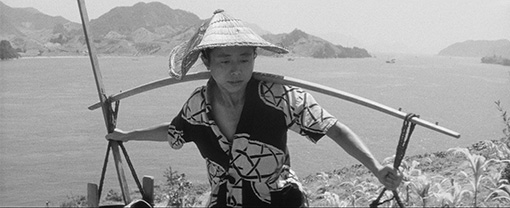
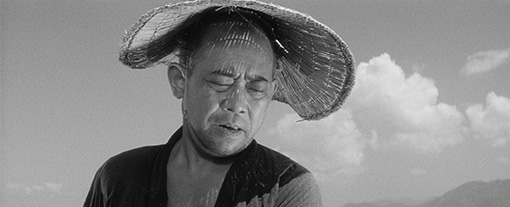
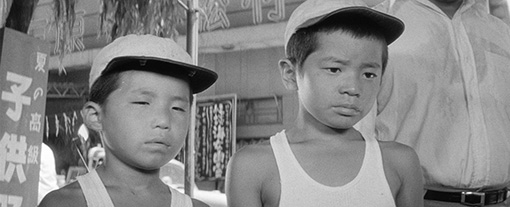
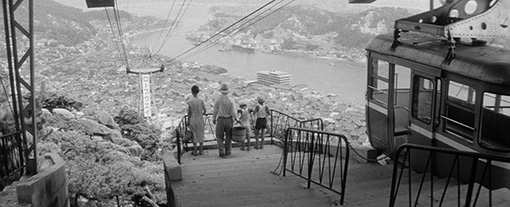
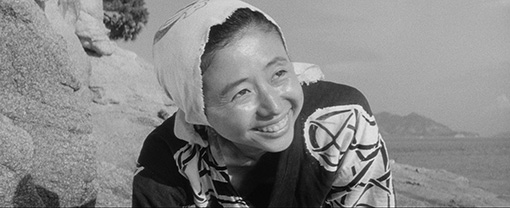
The Linear PCM mono 2.0 soundtrack has the expected restrictions on dynamic range but is still very clear and remarkably clean – even with the sound cranked up I could hear almost no trace of background hiss and heard no pops of damage. Hayashi Hikaru's lovely score is nicely handled.
The extra features included are the same as those on the previous DVD, minus the stills gallery, but this is no bad thing, as though small in number their quality and scope is impressive. To avoid bouncing back and forth between the Blu-ray and DVD reviews, I've reproduced (and slightly amended) my original comments on the extras below.
A Video Introduction is provided by director and student of Japanese cinema Alex Cox. Filmed in medium long shot from an angle that feels almost as if we are eavesdropping on a conversation with an unseen companion, it initially had me reaching for hair to tear out simply because just about every adjective I'd jotted down in my notebook to use in my review was also used by Cox, making it look almost as if I'd gone straight to this feature rather than watched the film. But this very fact helped to re-enforce my view that Shindô's minimalist approach (that's one of them) is clearly communicating its message, not leaving it to viewers to bring their own reading. Though identified as an introduction, I'd definitely watch this after seeing the film, as it contains some spoilers.
Given the film's age and origin, it's something of a treat to find included an Audio Commentary with director Shindô Kaneto and long time friend and composer Hayashi Hikaro, recorded in Japan in 2000 shortly after Shindô has completed work on Sanmon yakusha, his film about the actor Taiji Tonoyama, who is one of this film's stars. Given that Shindô was in his late 80s and Hayashi knocking on the door of 70 when this was recorded (you wouldn't know it from listening to them), it's a surprisingly chatty and lively affair and a very informative one. Inevitably the music is discussed at some length – its construction, effectiveness and even the moment when one of the French press at the Moscow Film Festival could be heard whistling it between jobs under the impression that it was the Japanese national anthem – but plenty of background is also provided on the filming, the locations and the island people who appeared in and worked on the film. Shindô also discusses the thinking behind his approach and the importance of having the whole crew working along the same lines. An enthralling and valuable commentary.
Also included is a redesign of the excellent Booklet that accompanied the DVD release featuring a detailed essay on the film by Acquarello, an interview with Shindô conducted in 1972 by Joan Mellen, who also provides a comprehensive introduction, credits for the film, stills and viewing instructions.
A genuinely great film is given a splendid Blu-ray upgrade, complete with all of the best extras from the earlier DVD release. When I reviewed the DVD back in 2005 I said of it: "Unless Criterion get hold of a new print and work the sort of wonders they have on Kurosawa's Red Beard and The Hidden Fortress, this looks set, for now at least, to be the definitive DVD version of a genuinely extraordinary work." Never mind Criterion, Masters of Cinema themselves have worked the required wonders and delivered what is already one of my favourite Blu-rays of the year. Highly recommended.
The Japanese convention of family name first has been used for Japanese names throughout this review
|